April Tran
The Weak Form Is Stronger Than You Think
Sep 10, 2024


Abstract:The weak form is a ubiquitous, well-studied, and widely-utilized mathematical tool in modern computational and applied mathematics. In this work we provide a survey of both the history and recent developments for several fields in which the weak form can play a critical role. In particular, we highlight several recent advances in weak form versions of equation learning, parameter estimation, and coarse graining, which offer surprising noise robustness, accuracy, and computational efficiency. We note that this manuscript is a companion piece to our October 2024 SIAM News article of the same name. Here we provide more detailed explanations of mathematical developments as well as a more complete list of references. Lastly, we note that the software with which to reproduce the results in this manuscript is also available on our group's GitHub website https://github.com/MathBioCU .
WgLaSDI: Weak-Form Greedy Latent Space Dynamics Identification
Jun 29, 2024Abstract:The parametric greedy latent space dynamics identification (gLaSDI) framework has demonstrated promising potential for accurate and efficient modeling of high-dimensional nonlinear physical systems. However, it remains challenging to handle noisy data. To enhance robustness against noise, we incorporate the weak-form estimation of nonlinear dynamics (WENDy) into gLaSDI. In the proposed weak-form gLaSDI (WgLaSDI) framework, an autoencoder and WENDy are trained simultaneously to discover intrinsic nonlinear latent-space dynamics of high-dimensional data. Compared to the standard sparse identification of nonlinear dynamics (SINDy) employed in gLaSDI, WENDy enables variance reduction and robust latent space discovery, therefore leading to more accurate and efficient reduced-order modeling. Furthermore, the greedy physics-informed active learning in WgLaSDI enables adaptive sampling of optimal training data on the fly for enhanced modeling accuracy. The effectiveness of the proposed framework is demonstrated by modeling various nonlinear dynamical problems, including viscous and inviscid Burgers' equations, time-dependent radial advection, and the Vlasov equation for plasma physics. With data that contains 5-10% Gaussian white noise, WgLaSDI outperforms gLaSDI by orders of magnitude, achieving 1-7% relative errors. Compared with the high-fidelity models, WgLaSDI achieves 121 to 1,779x speed-up.
A Comprehensive Review of Latent Space Dynamics Identification Algorithms for Intrusive and Non-Intrusive Reduced-Order-Modeling
Mar 16, 2024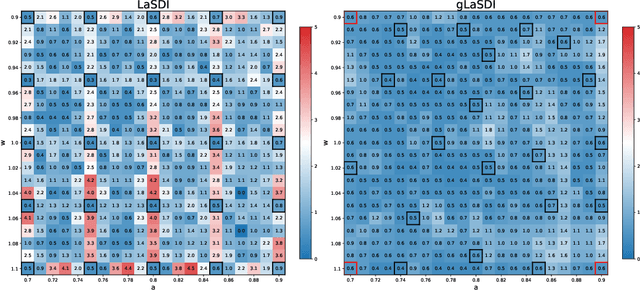
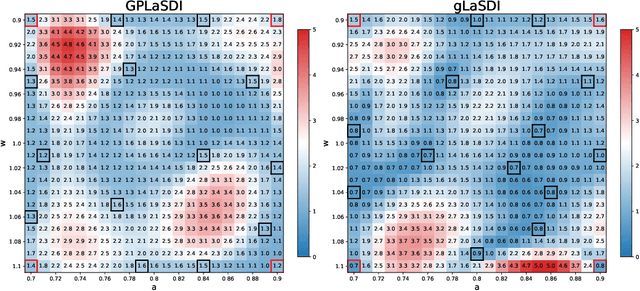
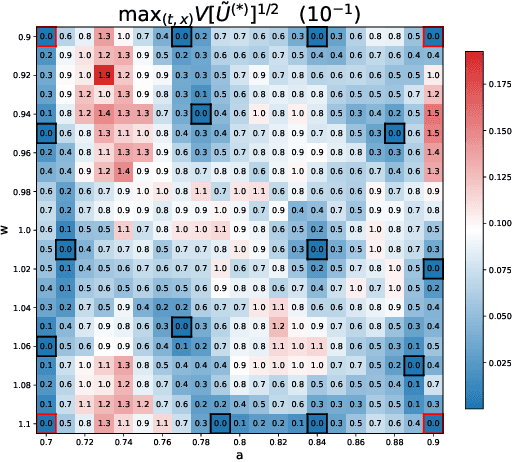
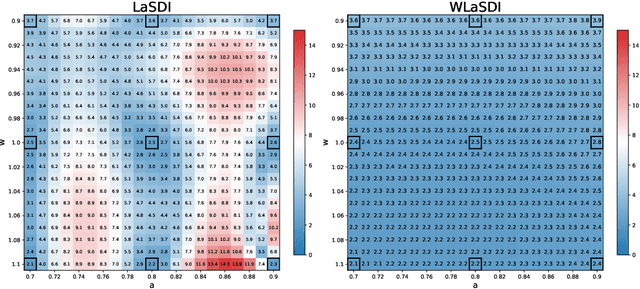
Abstract:Numerical solvers of partial differential equations (PDEs) have been widely employed for simulating physical systems. However, the computational cost remains a major bottleneck in various scientific and engineering applications, which has motivated the development of reduced-order models (ROMs). Recently, machine-learning-based ROMs have gained significant popularity and are promising for addressing some limitations of traditional ROM methods, especially for advection dominated systems. In this chapter, we focus on a particular framework known as Latent Space Dynamics Identification (LaSDI), which transforms the high-fidelity data, governed by a PDE, to simpler and low-dimensional latent-space data, governed by ordinary differential equations (ODEs). These ODEs can be learned and subsequently interpolated to make ROM predictions. Each building block of LaSDI can be easily modulated depending on the application, which makes the LaSDI framework highly flexible. In particular, we present strategies to enforce the laws of thermodynamics into LaSDI models (tLaSDI), enhance robustness in the presence of noise through the weak form (WLaSDI), select high-fidelity training data efficiently through active learning (gLaSDI, GPLaSDI), and quantify the ROM prediction uncertainty through Gaussian processes (GPLaSDI). We demonstrate the performance of different LaSDI approaches on Burgers equation, a non-linear heat conduction problem, and a plasma physics problem, showing that LaSDI algorithms can achieve relative errors of less than a few percent and up to thousands of times speed-ups.
Weak-Form Latent Space Dynamics Identification
Nov 20, 2023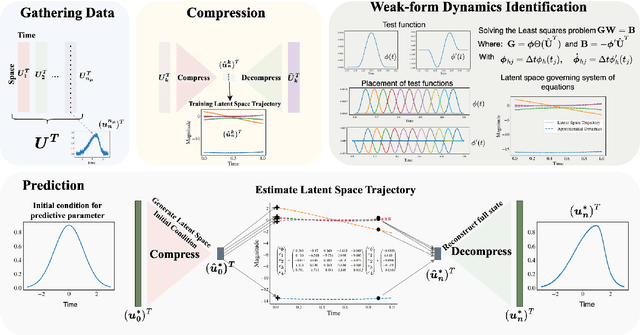
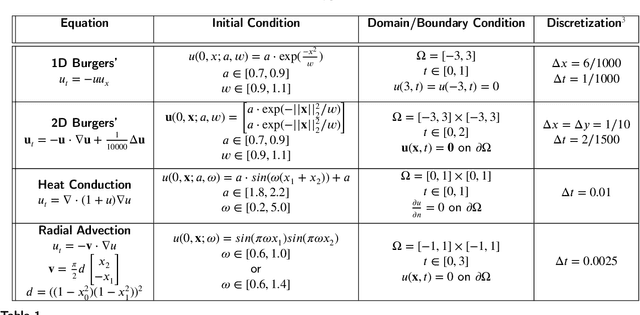
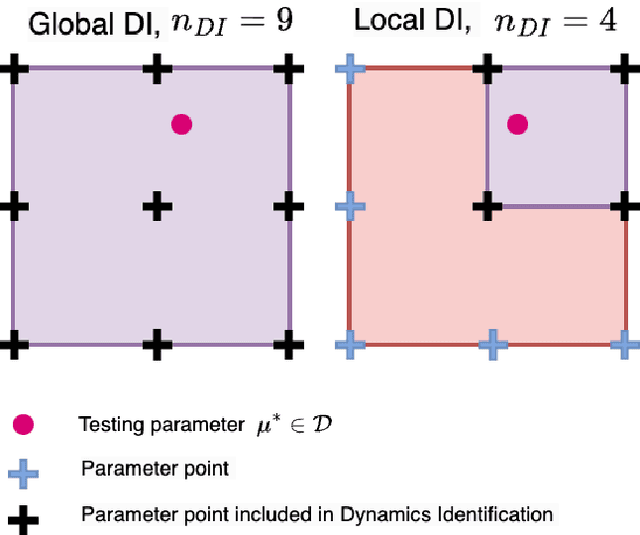
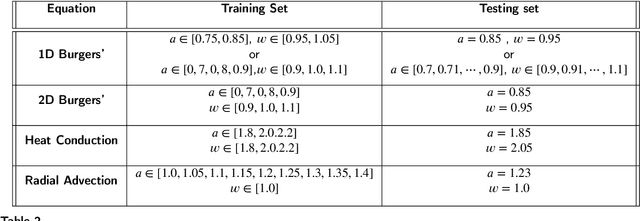
Abstract:Recent work in data-driven modeling has demonstrated that a weak formulation of model equations enhances the noise robustness of a wide range of computational methods. In this paper, we demonstrate the power of the weak form to enhance the LaSDI (Latent Space Dynamics Identification) algorithm, a recently developed data-driven reduced order modeling technique. We introduce a weak form-based version WLaSDI (Weak-form Latent Space Dynamics Identification). WLaSDI first compresses data, then projects onto the test functions and learns the local latent space models. Notably, WLaSDI demonstrates significantly enhanced robustness to noise. With WLaSDI, the local latent space is obtained using weak-form equation learning techniques. Compared to the standard sparse identification of nonlinear dynamics (SINDy) used in LaSDI, the variance reduction of the weak form guarantees a robust and precise latent space recovery, hence allowing for a fast, robust, and accurate simulation. We demonstrate the efficacy of WLaSDI vs. LaSDI on several common benchmark examples including viscid and inviscid Burgers', radial advection, and heat conduction. For instance, in the case of 1D inviscid Burgers' simulations with the addition of up to 100% Gaussian white noise, the relative error remains consistently below 6% for WLaSDI, while it can exceed 10,000% for LaSDI. Similarly, for radial advection simulations, the relative errors stay below 15% for WLaSDI, in stark contrast to the potential errors of up to 10,000% with LaSDI. Moreover, speedups of several orders of magnitude can be obtained with WLaSDI. For example applying WLaSDI to 1D Burgers' yields a 140X speedup compared to the corresponding full order model. Python code to reproduce the results in this work is available at (https://github.com/MathBioCU/PyWSINDy_ODE) and (https://github.com/MathBioCU/PyWLaSDI).
 Add to Chrome
Add to Chrome Add to Firefox
Add to Firefox Add to Edge
Add to Edge